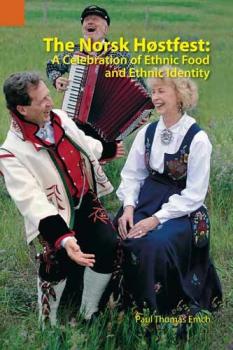ТОП просматриваемых книг сайта:
Publications in Ethnography
Скачать книги из серии Publications in EthnographyАннотация
The Norsk Høstfest: A Celebration of Ethnic Food and Ethnic Identity Paul Thomas Emch SIL International* and the International Museum of Cultures Publications in Ethnography 41 What does it mean to be Norwegian-American? This study, of interest to laymen and scholars alike, answers this question by examining the prominent traditions and functions of food at the annual Norsk Hostfest celebration held in Minot, North Dakota. In this book, the author uses anthropological methodology to demonstrate the ways in which the Norsk Hostfest serves as a celebration of what it means to be Norwegian-American. There are many powerful symbols of ethnic identity in evidence at the festival, but food is the most pervasive, and so it is the chief symbol examined in this study. The Norsk Hostfest not only allows for the maintenance and celebration of Norwegian-American culture, but it synthesizes the forces of globalization, localization, and ethnicity in order to keep Norwegian-American ethnic identity alive and vital in a changing world. Norwegian-Americans of all ages who want to better understand their own culture will find this book both intriguing and informative. Students of food, culture, and ethnic identity, will find the application of symbolic anthropology useful. Paul Emch completed his M.A. in cultural anthropology at North Dakota State University in 2006. He currently serves as an intercultural community worker and anthropology consultant in Central Sulawesi, Indonesia.
Аннотация
Misunderstood: one thing foreigners never want to be! But Africans and Westerners, interpreting the world through different cultural lenses, misunderstand each other with alarming regularity. This is sometimes funny, sometimes scandalous, but always damages credibility. This book is designed to promote cultural competence among Westerners working in Africa and among Africans living in the West. Cultural competence—knowing what one needs to know to act in a manner acceptable in a society—is the first step to credibility and the surest antidote to being misunderstood. DiGennaro creatively introduces dialog between two fictitious characters: Juma as the African voice, and Wesley as the Western voice. They articulate their culture’s perspectives on seven themes, themes which were identified by Westerners in Africa and by their African co-workers, as the most chronic points of cross-cultural stress: organization, finances, friendship, spirituality, communication and conflict, leadership, and work. Easy to read and broad in approach, this book is ideal for North Americans and Europeans who desire to expand their appreciation and comprehension of Africans’ social reality. Debbi DiGennaro (M.A. in Social Work, The Ohio State University) moved to East Africa in 2008. She leaned heavily on her training in social sciences to facilitate her understanding of work and relationship patterns in Africa. Based in Nairobi with her family, DiGennaro currently leads the regional team of a faith-based NGO.


